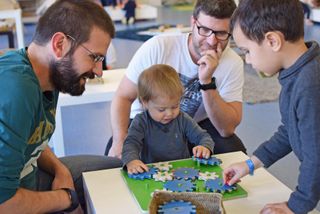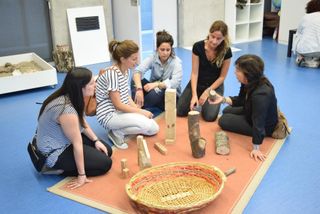- The science ideas at UManresa’s Lab 0-6 will reach 12,000 children in Catalonia aged between 0 and 6 years old in the 2017-2018 academic year
- Lab 0-6 advises international projects on science spaces in schools and universities
Almost 6,000 children visited Lab 0-6 with their school during the 2017-2018 academic year. More than 1,000 were accompanied by their families, and about 5,000 took part in its mobile Lab on Wheels service. A total of 12,000 children aged between 0 and 6 years old from all over Catalonia were able to experiment with the ideas at this centre for discovery, research and documentation for scientific education at early ages, run by the EHEA degree course in Pre-School Teaching at the Faculty of Social Sciences in Manresa.
It was founded in January 2016, and in just three years it has become a benchmark in raising interest in science among young children, both for families and for schools, as well as for teachers and researchers in the national level and international spheres. Montserrat Pedreira, the director of the EHEA degree in Pre-School Teaching at the Faculty of Social Sciences of Manresa, explains that "Lab 0-6 was established to meet a need that was evident in our studies: to show that science is possible at the earliest ages, and to provide the resources and the spaces to make that possible."
Lab 0-6 works in three very different but complementary areas: making science accessible for children aged between 0 to 6 years old, training pre-school teaching staff in the didactics of science, and research in the same field. The laboratory's distinguishing feature is that all its research work is transferred both to teaching, in both initial training and lifelong learning, and to the children and their families.

Lab 0-6 offers ideas for scientific experimentation for groups of school students and children accompanied by their families
The Lab on wheels can reach many more children
Lab 0-6 is above all a centre where children aged from 0 to 6 years old can experiment, and is open to schools and families. It is open in the morning to groups of school students during the week, and open to families on Sundays. Its 300 m2 can accommodate up to 50 children at a time, which means that groups of schoolchildren can visit during school hours, and children accompanied by their families can visit at weekends.
The centre also has a mobile unit, the Lab on wheels, which goes to nursery schools to make the children's experience more accessible during this period of their education. It is a van equipped with various ideas for scientific experimentation, which is specifically designed for children aged between 0 to 3 years old, and has an educator to run the activities.
Teacher training and research keep the centre's activities innovative and transfer them to schools
Research and training in science education for teachers
Teacher training in science education for the youngest children is another of the areas of action at Lab 0-6. Last year, 544 teachers participated in one of the 11 training activities organised by the centre. Indeed, the excellent work done in this field since its inception has led to the signing of an agreement with the Ministry of Education for two people to work part-time on organising educational and pedagogical activities for teachers, related to innovation in science teaching.
The teachers who take part in the training sessions at Lab 0-6 rate its contribution very highly, as an external resource where school groups can perform experiments in a large space using a wide variety and a large number of ideas, as well as the stimulus it provides in terms of creating their own science space in classrooms in pre-school teaching. Núria Monclús, at the school in Copons (Anoia), explains how "Lab 0-6 has given me a bolder new perspective on how to approach science at school. It has showed me what children are capable of in the field of scientific experimentation."

Advising European schools on creating science spaces
Research is also one of the cornerstones of the work done at Lab 0-6. This work is coordinated by the research group GRENEA (Education, Neuroscience, Experimentation and Learning Research Group) which is involved in transfer initiatives aimed at discussion, proposals and progress in incorporating scientific experimentation in pre-school teaching. Their work crosses international borders, and has led to international consultancy. One of the most outstanding projects has been the consultancy work for the "Early years explorers" project at Manchester Metropolitan University, which aims to produce science projects for English schools.
Three educators, six researchers and two teachers from the Ministry of Education provide content for the work done at Lab 0-6
Lab 0-6 has three teachers who encourage the children to consider questions about the materials they can find in the centre's different thematic areas: experimentation, matter, light and exterior. It also has a team of six researchers and two teachers from the Ministry of Education, who are responsible for running and coordinating training activities aimed at teachers working in pre-school teaching. Scholarship students on the EHEA Degree course in Pre-School Teaching at UManresa also provide support for educational activities. It is an opportunity that they rate very highly. According to Sandra Guiu, a former student on the course, "it is an experience that enables you to gain confidence as a professional and at the same time to put classroom learning into practice."
Lab 0-6 is supported by ICL Iberia, a company in the mining sector in the Bages region which provides funding, as materials and technical knowledge aimed at fostering an interest in science and encouraging scientific vocations at early ages.